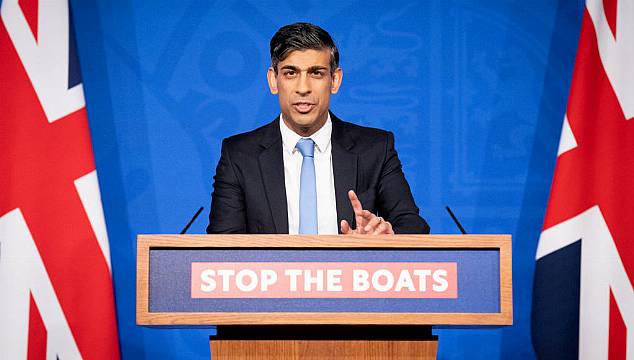A judge has ruled that provisions of the UK’s Illegal Migration Act should be disapplied in Northern Ireland, as they undermine human rights protections guaranteed in the region under post-Brexit arrangements.
Mr Justice Humphreys also said aspects of the Act were incompatible with the European Convention on Human Rights (ECHR).
The post-Brexit Windsor Framework jointly agreed by the UK and EU includes a stipulation that there can be no diminution of the rights provisions contained within Northern Ireland’s Good Friday peace agreement of 1998.
The Illegal Migration Act provides new powers for the British government to detain and remove asylum seekers it deems to have arrived illegally in the UK. Central to the new laws is the scheme to send asylum seekers to Rwanda.
Mr Justice Humphreys delivered judgment at Belfast High Court on Monday in two challenges against the Act that focused on the peace process human rights protections guaranteed by the Windsor Framework.
The judge found that several elements of the Act do cause a “significant” diminution of the rights enjoyed by asylum seekers residing in Northern Ireland under the terms of the Good Friday Agreement.
“I have found that there is a relevant diminution of right in each of the areas relied upon by the applicants,” he said.
He added: “The applicants’ primary submission therefore succeeds. Each of the statutory provisions under consideration infringes the protection afforded to RSE (Rights, Safeguards and Equality of Opportunity) in the Belfast/Good Friday Agreement.”
The judge ruled that the sections of the Act that were the subject of the legal challenges should be “disapplied” in Northern Ireland.
He also declared aspects of the Act incompatible with the ECHR.
One of the cases was taken by the Northern Ireland Human Rights Commission and the other by a 16-year-old asylum seeker from Iran who is living in Northern Ireland having arrived in the UK as an unaccompanied child.
The boy, who travelled from France by small boat and claimed asylum in July 2023, has said he would be killed or sent to prison if he returned to Iran.
The judge agreed to place a temporary stay on the disapplication ruling until another hearing at the end of May, when the applicants will have an opportunity to respond to the judgment.
Dr Tony McGleenan KC, representing the British government, indicated that an appeal may be considered.
“We’ll be taking our instructions on the judgment and the position in terms of any further litigation will become clear, my Lord,” he said.
Outside court, solicitor Sinead Marmion, who represented the teenage Iranian asylum seeker applicant, said the judgment was “hugely significant”.
Ms Marmion said the judgment would prevent the Rwanda scheme applying in Northern Ireland.
“This is a huge thorn in the [British] government’s side and it has completely put a spanner in the works,” she told the PA news agency.
“There’s a huge obstacle in the way of them being able to actually implement that in Northern Ireland now, as it’s been found to be incompatible with the Windsor Framework.”







